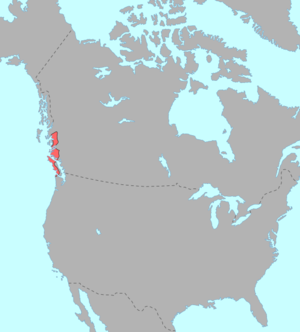Wakashan languages
| Wakashan | |
|---|---|
| Geographic distribution |
British Columbia, Canada |
| Linguistic classification | One of the world's primary language families |
| Subdivisions |
|
| ISO 639-2 / 5 | |
| Glottolog | waka1280 |

Pre-contact distribution of Wakashan languages
|
|
Wakashan is a family of languages spoken in British Columbia around and on Vancouver Island, and in the northwestern corner of the Olympic Peninsula of Washington state, on the south side of the Strait of Juan de Fuca.
As is typical of the Northwest Coast, Wakashan languages have large consonant inventories—the consonants often occurring in complex clusters.
The Wakashan language family consists of seven languages:
I. Northern Wakashan (Kwakiutlan) languages
II. Southern Wakashan (Nootkan) languages
In the 1960s Swadesh suggested a connection with the Eskimo-Aleut languages. This was picked up and expanded by Holst (2005). Sergei Nikolaev has argued in two papers for a systematic relationship between the Nivkh language of Sakhalin island and the Amur river basin and the Algic languages and a secondary relationship between these two together and the Wakashan languages,.
The name Wakesh or Waukash is Nuu-chah-nulth for "good." It was used by early explorers including Captain James Cook, who believed it to be the tribal appellation.
Juan de Fuca was probably the first European to meet Wakashan-speaking peoples, and Juan Perez visited the Nuu-chah-nulth people in 1774. After 1786, English mariners frequently sailed to Nootka Sound; in 1803 the crew of the American ship Boston were almost all killed by these Indians.
In 1843 the Hudson's Bay Company established a trading post at Victoria. European-Canadians had regular contact with the First Nations after that time. There were dramatic population losses in the early 20th century due to smallpox epidemics, because the First Nations had no acquired immunity to the new disease; social disruption and alcoholism. In 1903 the Aboriginals numbered about 5200, of whom 2600 were in the West Coast Agency, 1300 in the Kwakewith Agency, 900 in the North West Coast Agency, and 410 at Neah Bay Company, Cape Flattery. In 1909 they numbered 4584, including 2070 Kwakiutl and 2494 Nootka. Roman Catholic missionaries were active in the region.
...
Wikipedia
